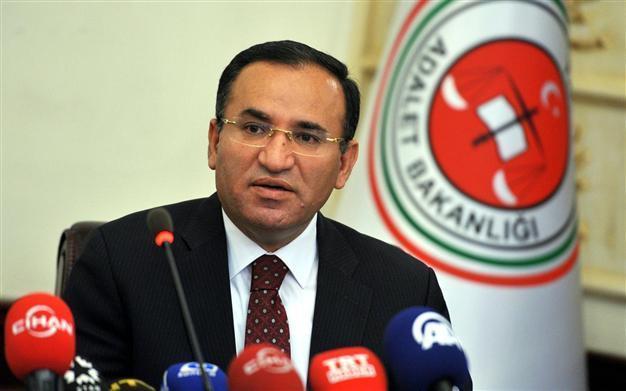Government incentives for judicial officers spark controversy
ANKARA

Justice Minister Bekir Bozdağ held a press conference on Sept. 9 to announce the details of a bill outlining various benefits for judicial officers.
The ruling Justice and Development Party (AKP) has unveiled incentives for judicial officers in the run up to a key election at Turkey’s top judicial body, prompting the main opposition party’s leader to label the incentives as a “political bribe.”Justice Minister Bekir Bozdağ held a press conference on Sept. 9 to announce the details of a bill outlining various benefits for judicial officers, including an amnesty for disciplinary penalties and a salary increase.
The bill will be introduced to Parliament on Sept. 10, and General Assembly debates on the bill will most likely be finalized in October, Bozdağ said.
The bill has been met with criticism by those who portray its proposal as “an investment for the elections,” which will be held at the Supreme Council of Judges and Prosecutors (HSYK) on Oct. 12. However, Bozdağ described such criticism as “black propaganda.”
Speaking hours after Bozdağ’s press conference, however, main opposition Republican People’s Party (CHP) leader Kemal Kılıçdaroğlu accused the AKP government of “political bribery.”
“If a judge and a prosecutor are to vote in favor of the ruling party just because that ruling party provided them financial opportunities, then they are not truly a judge or a prosecutor,” Kılıçdaroğlu said.
Incentives
Bozdağ announced details of the substantial rise at his press conference.
“A rise on an equal basis, amounting to 1,155 Turkish Liras, is outlined for the salaries of judges and prosecutors who are serving at courts of first instance, as well as members of the Supreme Court of Appeals and the Council of State ... Judges and prosecutors at the beginning of their professions receive 3,986 liras as a salary at the moment. This will be raised to 5,141 liras,” he said.
The justice minister also announced that the bill granted an amnesty to judicial officers’ disciplinary penalties given for acts committed between Feb. 14, 2005 and Sept. 1, 2013.
According to the bill, administrative law judges, prosecutors and members of the Council of State who have not graduated from law faculties but who have completed five years in office will be given an opportunity to attend law faculties without having to take the Central University Exam.
In preliminary government plans, this opportunity was planned to be granted to those who had completed 10 years in office. The government reduced this limit to five years upon demands conveyed by the president of the Council of State and judges, Bozdağ said.
‘Political bribe’
CHP head Kılıçdaroğlu, however, described the move as a "political bribe."
"An election will be held at the Supreme Council of Judges and Prosecutors. Here is my objection: Why are you going to the government?” he said, referring to a Sept. 4 meeting where newly assigned Prime Minister Ahmet Davutoğlu met a group of judicial officers, the “Platform for Unity in Judiciary,” which outlined its demands, including amnesty for disciplinary penalties.
“If they [judges and prosecutors] are to hold an election among themselves, then what are they doing with the justice minister and the prime minister? No offense, but the term for saying ‘I will give a pay rise to you if you support my list,’ is 'political bribe,'” Kılıçdaroğlu said.
“I cannot accept judges and prosecutors being oppressed within this process, while they will make their decision. I believe that they will elect judges and prosecutors to the HSYK in the literal sense, by listening to their consciences,” he added.
The government’s incentive platform is widely considered to be directly related to its attempt to break the alleged dominance of followers of U.S.-based Islamic scholar Fethullah Gülen in the judiciary, who it claims acts as a “parallel state.”
Government officials have suggested that the upcoming HSYK elections should be included within the framework of the struggle against the “parallel state.” In February, a government-led law transferred significant power from the HSYK to the Justice Ministry.
The government considers the Oct. 12 vote at the HSYK as another opportunity to curb Gülen’s alleged influence. Turkey’s 15,000 judges and prosecutors will choose 10 principal members and six reserve members from the HSYK board in the elections.
“I believe that the vast majority of judges and prosecutors will not allow perception of Turkish judiciary as ‘Fethullah Gülen’s judiciary.’ I want to state that in these HSYK elections, judges and prosecutors will get rid of this shadow that has been formed over them,” Bozdağ said on Sept. 9.
Referring to a recent meeting between President Recep Tayyip Erdoğan and U.S. President Barack Obama, the justice minister said placing Gülen and the parallel state on the meeting’s agenda was a “requirement of international law.”
















